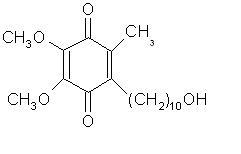Classified as
Vitamin
Also called
CoQ10, vitamin Q10, ubiquinone, ubidecarenone,
2,3-dimethoxy,5-methyl, 6-polyisoprene parabenzoquinone
Structure of Coenzyme Q10
Intro and Background
Coenzyme Q10 is a natural compound that is essential to the body's natural production of energy. 1 In 1957, researchers at the University of Wisconsin won the Nobel Prize for discovering the role this vitamin plays in the body. Meat and poultry are the primary sources of dietary CoQ10, while supplements are also widely available. 1 Researchers have found that cancer patients usually have lower levels of CoQ10 in their blood plasma than healthy individuals. 2 This finding serves as a basis for research into CoQ10 treatment. In order to see a significant increase in coenzyme Q10 levels, about 100mg/day need to be taken in supplement form. 3
Scientific Research
There is a limited number of trials in which CoQ10 is used to treat cancer in humans, and even these are not assuringly conclusive in their results. Nonetheless, low levels of CoQ10 have become an important way to determine the risk of melanoma progression. 4 CoQ10 can inhibit cancer cell proliferation during in vitro 5 as well as animal experiments. 6 Another study shows that the combined effect of CoQ10 and a cancer drug (Tamoxifen) can help suppress the growth of breast cancer cells in rats. 7 CoQ10 has also shown the ability to block some of the toxicity, or negative side effects, of chemotherapy which can help improve a patient's quality of life. 8 In a study involving people diagnosed with melanoma and treated with CoQ10 (and interferon), CoQ10 treatment resulted in a smaller likelihood for the melanoma to reappear. This same study also showed that patients experienced an increase quality of life with CoQ10 intake.9 Another study involving supplementation with CoQ10, as well as L-carnitine and amino acids, suggests that the combination may improve cancer-related fatigue.10 In contrast, another randomized, controlled trial showed that CoQ10 taken with Vitamin E did not improve quality of life or fatigue levels.11
There are currently no clinical trials investigating Coenzyme Q10 as a cancer treatment. 12 For information about ongoing clinical trials involving coenzyme Q10, please visit our section on Finding Clinical Trials.
For Further Reading
The National Cancer Institute has published a Physician Data Query (PDQ) summary on Conenzyme Q10.
US Food and Drug Administration Approval
There is not enough evidence to support CoQ10's effectiveness as a cancer treatment, and the FDA has not approved CoQ10 for the treatment of any medical condition.13 It is available commercially because it is sold as a dietary supplement, and dietary supplements do not require FDA approval unless the seller claims that they can cure or prevent disease.14
Please be sure to see our notice on complementary therapies. To better understand and evaluate the research described above, read our Introduction to Scientific Research.
- 1ab Roffe L, Schmidt K, Ernst E. Efficacy of coenzyme Q10 for improved tolerability of cancer treatments: a systematic review. Journal of Clinical Oncology. (2004) 22(21): 4418-24. [PUBMED]
- 2 Folkers K, Ostemborg A, Nylander M, Morita M, Mellstedt H. Activities of vitamin Q10 in animal models and serious deficiency in patients with cancer. Biochem Biophys Res Commun 1997; 234:296299 [PUBMED]
- 3 Crane FL. Biochemical functions of coenzyme Q10. J Am Coll Nutr. (2001) 20(6): 591-8 [PUBMED]
- 4 Rusciani L, Proietti I, Rusciani A, Paradisi A, Sbordoni G, Alfano C, et al. Low plasma coenzyme Q10 levels as an independent prognostic factor for melanoma progression. J Am Acad Dermatol 2006; 54:234241. [PUBMED]
- 5 Kawase I, Niitani H, Saijo N, Sasaki H, Morita T. Enhancing effect of coenzyme Q10 on immunorestoration with Mycobacterium bovis BCG in tumor bearing mice. Gann 1978; 69:493497 [PUBMED]
- 6 Bruge F, Tiano L, Cacciamani T, Principi F, Littarru GP. Effect of UV-C mediated oxidative stress in leukemia cell lines and its relation to ubiquinone content. Biofactors 2003; 18:5163 [PUBMED]
- 7 Perumal SS, Shanthi P, Sachdanandam P. Combined efficacy of tamoxifen and coenzyme Q10 on the status of lipid peroxidation and antioxidants in DMBA induced breast cancer. Mol Cell Biochem. (2005) 273(1-2): 151-60. [PUBMED]
- 8 Baggio E, Gandini R, Plancher AC, Passeri M, Carmosino G. Italian multicenter study on the safety and efficacy of coenzyme Q10 as adjunctive therapy in heart failure. CoQ10 Drug Surveillance Investigators. Mol Aspects Med 1994; 15 (Suppl):S287S294. [PUBMED]
- 9 Rusciani L, Proietti I, Paradisi A, Rusciani A, Guerriero G, Mammone A, De Gaetano A, Lippa S. Recombinant interferon alpha-2b and coenzyme Q10 as a postsurgical adjuvant therapy for melanoma: a 3-year trial with recombinant interferon-alpha and 5-year follow-up. Melanoma Res. (2007) 17(3): 177-83 [PUBMED]
- 10 Iwase S, Kawaguchi T, Yotsumoto D, Doi T, Miyara K, Odagiri H, Kitamura K, Ariyoshi K, Miyaji T, Ishiki H, Inoue K, Tsutsumi C, Sagara Y, Yamaguchi T. Efficacy and safety of an amino acid jelly containing coenzyme Q10 and L-carnitine in controlling fatigue in breast cancer patients receiving chemotherapy: a multi-institutional, randomized, exploratory trial (JORTC-CAM01). Support Care Cancer. 2016 Feb;24(2):637-46. [PUBMED]
- 11 Lesser GJ, Case D, Stark N, Williford S, Giguere J, Garino LA, Naughton MJ, Vitolins MZ, Lively MO, Shaw EG; Wake Forest University Community Clinical Oncology Program Research Base. A randomized, double-blind, placebo-controlled study of oral coenzyme Q10 to relieve self-reported treatment-related fatigue in newly diagnosed patients with breast cancer. J Support Oncol. 2013 Mar;11(1):31-42. [PUBMED]
- 12 National Library of Medicine. (2007). "ClinicalTrials.gov" Retrieved June 2, 2010 from the National Institutes of Health [http://www.clinicaltrials.gov/ct/search;jsessionid=77C2E74E90EC0B1C27B8F039E1FA6244?term=Coenzyme+Q10%2C+cancer&submit=Search]
- 13 US Food and Drug Adminstration website. Accessed 6/20/2016. [http://www.fda.gov/]
- 14 PDQ® Integrative, Alternative, and Complementary Therapies Editorial Board. PDQ Coenzyme Q10. Bethesda, MD: National Cancer Institute. Updated <04/21/2016>. Available at: http://www.cancer.gov/about-cancer/treatment/cam/hp/coenzyme q10-pdq. Accessed <06/20/2016> [PUBMED]

